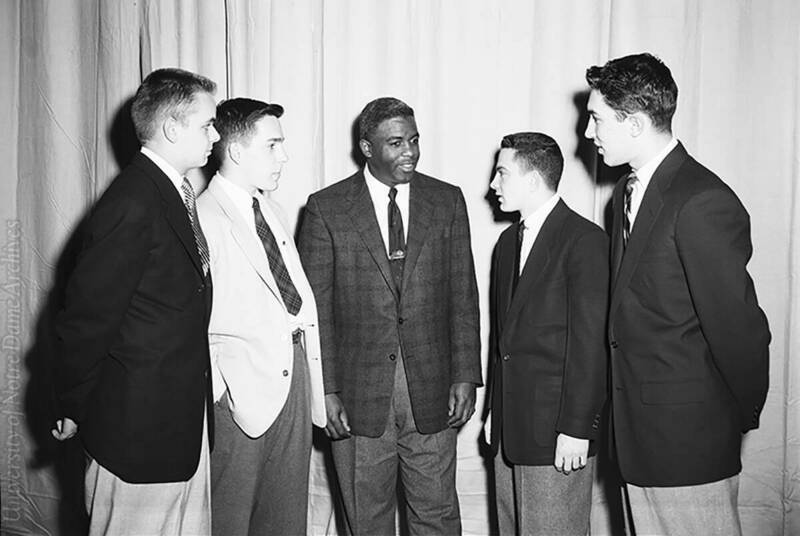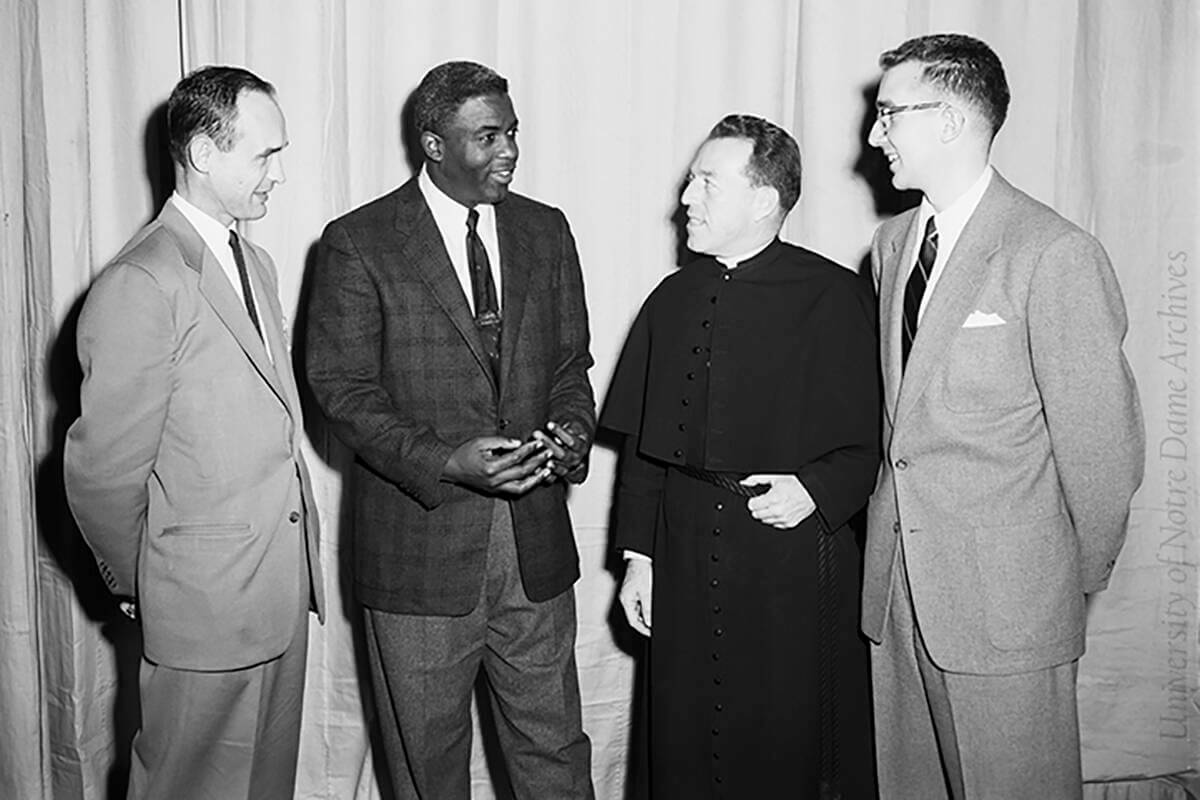 Robinson meets with students during his 1954 visit to Notre Dame. Photos courtesy University of Notre Dame Archives
Robinson meets with students during his 1954 visit to Notre Dame. Photos courtesy University of Notre Dame Archives
It was 70 years ago this week — on February 10, 1954 — that baseball great Jackie Robinson came to Notre Dame and South Bend to speak about brotherhood, cooperation and eliminating prejudices.
He declared that slow but steady progress was being made in race relations.
“There is very little to worry about when youngsters can band together the way you have tonight to eliminate the false thinking which many of us are guilty of,” Robinson told an audience of local teenagers at a brotherhood banquet at Hering House Community Center, the South Bend Tribune reported. “Unfortunately, some of us forget to fight this false thinking on a full-time basis.”
At the time, Robinson was already an internationally known athlete and civil rights activist. In 1947, as a member of the Brooklyn Dodgers, he was the first African American to play in Major League Baseball in the modern era. In breaking the color barrier, Robinson faced objections from some teammates, racial abuse from fans and opposing teams, and threats to his family.
He was Rookie of the Year in 1947 and the National League’s Most Valuable Player in 1949.
During the season before his visit here, Robinson had a .329 batting average, drove in 95 runs and stole 17 bases, leading the Dodgers to another National League pennant.
At Notre Dame, the baseball star spoke to students in Washington Hall on the topic of “Brotherhood and Sports.” The event was sponsored by the Student Senate.
Robinson’s visit was part of a five-city speaking tour in his role as national chairman of community organizations for National Brotherhood Week, an annual event that for decades was organized by the National Conference of Christians and Jews.
The NCCJ (now known as the National Conference for Community and Justice) was founded in 1927 in response to anti-Semitism and anti-Catholic sentiment prompted by the presidential run of New York Governor Alfred E. Smith. (Smith was awarded Notre Dame’s Laetare Medal in 1929).

Brotherhood should be practiced 52 weeks a year, and not just one, Robinson told the teen audience. That talk occurred at Hering House, an African-American community center in South Bend that had been established in 1924 by former Notre Dame football coach Frank Hering and his wife, Claribel.
On that single day, Robinson spoke at Notre Dame, two local high schools, the South Bend YMCA and Hering House.
Robinson’s talk on campus wasn’t covered by the campus or local media, but he made reference to his Notre Dame appearance during the Hering House gathering, as reported in the Tribune.
“I was uplifted by my experience at Notre Dame this afternoon,” Robinson said. He had learned that students from 60 foreign nations attended the University. “These students will return to their countries with the impression of the United States and Americans that they are given at Notre Dame. If they find discrimination or meet fellows who believe that second-class citizens exist in the United States, they will take this impression back home with them. I don’t think they get this impression at Notre Dame and we must make sure they never will.”
At the time, Notre Dame’s African American enrollment was miniscule. The first three Black students had earned degrees just a few years earlier: Frazier Thompson ’47; Edward B. Williams ’47; and Carl R. Coggins ‘47, ’52.
By 1950, a total of 11 Black students had attended Notre Dame, Ebony magazine reported.
A series of rare comic books depicting Robinson’s life and career from the late 1940s and early 1950s are now part of the Joyce Sports Research Collection in the Hesburgh Library.
Robinson and the Dodgers won the World Series in 1955. He retired from professional baseball after the 1956 season with a career .313 batting average, 1,563 hits and 200 stolen bases. He continued his civil rights efforts, worked as an executive for Chock Full O’ Nuts coffee company and helped establish the Black-owned Freedom Bank.
Robinson returned to town in November 1966 to serve as the keynote speaker at the Greater South Bend Housing Conference, held in Notre Dame’s Center for Continuing Education. He was introduced at the event by University President Rev. Theodore M. Hesburgh, CSC, who had been serving on the U.S. Civil Rights Commission since 1957.
In introducing Robinson, Hesburgh said: “It’s not easy to be a pioneer. A lot of people are behind you and none are in front— you’re leading the way.”
The goal of the conference was to seek equal opportunity in housing. In his talk, Robinson called decent housing “one of the most basic and urgent needs of minority group members in the nation.”
Robinson died in 1972 at age 53.
In 1997, his uniform number, 42, was retired across all Major League teams. He was the first pro athlete in any sport to be honored in that manner.
Margaret Fosmoe is an associate editor of this magazine.